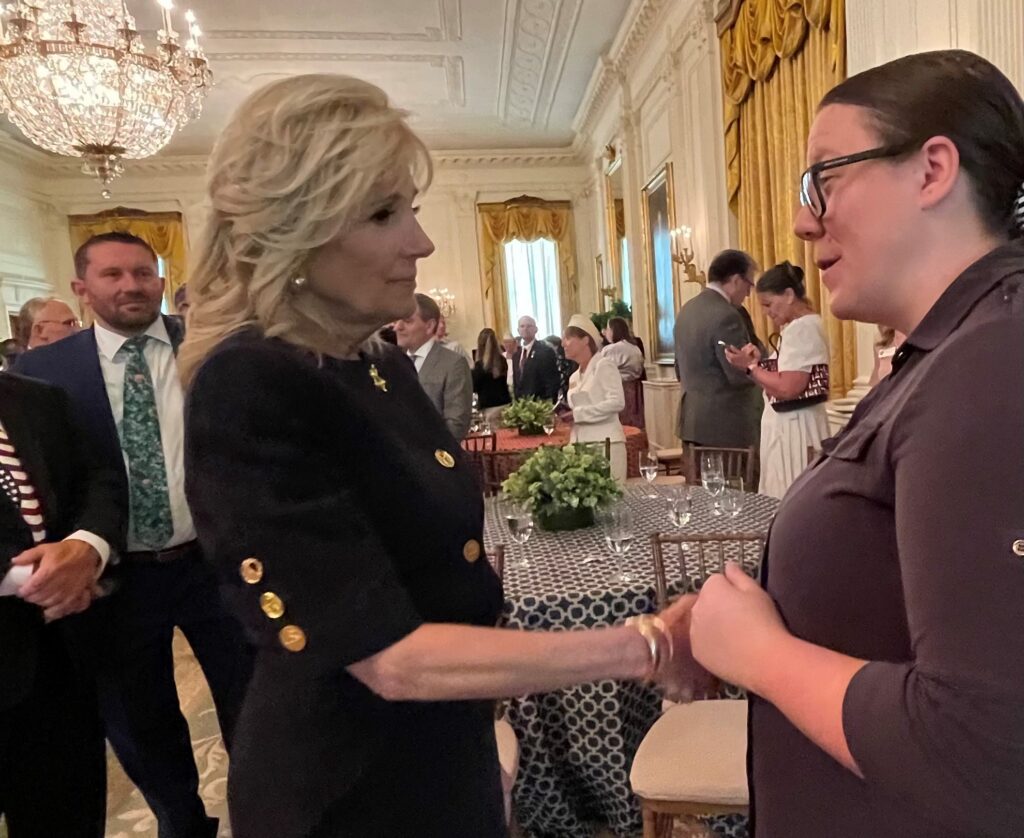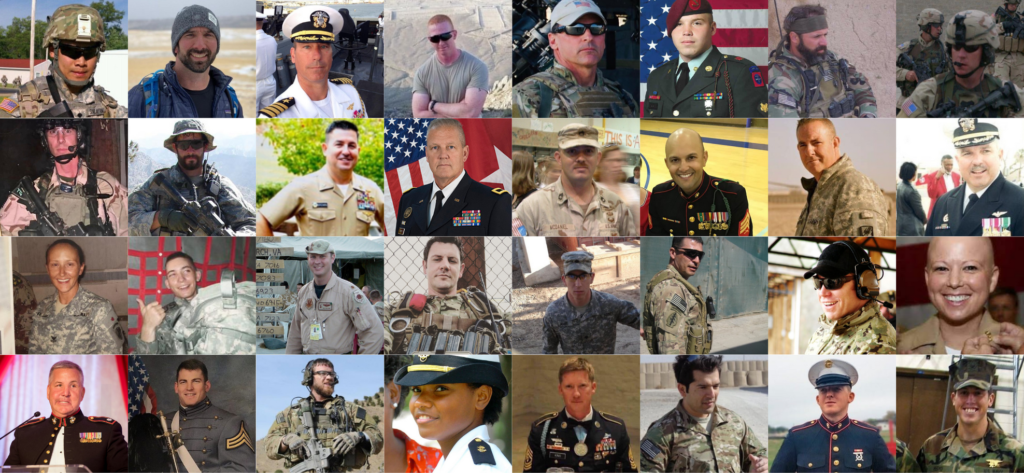It feels like every day is Memorial Day: Delayed Diagnoses, Unusual Cancers, Unsuspecting Patients.
May 30, 2022
This morning, Memorial Day, members of our team were invited to the White House for a Memorial Day Breakfast to honor those no longer with us.
We found ourselves in the East Room with about 50 others, bumping elbows with SEAC Ramon Colon-Lopez and General Mark A. Milley, Chairman of the Joint Chiefs of Staff, Dr. Steven Lieberman who is the Deputy Under Secretary for Health at the Department of Veterans Affairs, and many high ranking military officials. I look at the President of the Military Women’s Memorial, fellow Army veteran and registered nurse, CW5 (ret.) Phyllis Wilson and say to her jokingly, “I don’t belong here“, she looks directly at me and says “You are exactly where you need to be” and walks me over to the First Lady, Dr. Jill Biden.
For context, Dr. Jill Biden created a initiative in 2011 named the “Joining Forces” Initiative, so establish a deeper, more meaningful connection within the community and military veterans, much of this encompassed healthcare. And went on to partner with the American Academy of Nurses to create a prevention-based clinical question titled “Have you ever served in the military” Campaign: a simple, yet impactful way to identify those at risk.
Fast-forward to this morning, we are here, nearly 10 years later speaking with the (now) First Lady in the White House on how we can positively impact veteran healthcare for the 75% of post-9/11 veterans that do not utilize the VA, meanwhile the senior military and Veterans Affairs leadership is looking on.

“Dr. Biden, Politics and parties aside, our team is comprised of medical providers first and foremost. Our goal is to save lives, period… and, I wouldn’t bring you a problem with out three viable solutions to that problem. We have the answer.”
It goes against our morality and ethical practice to watch in silence as hundreds of thousands of post-9/11 veterans are misdiagnosed daily, ultimately sealing their terminal fate. If it can happen to a four-star general, a Medal of Honor Recipient, the son of the President of the United States, it can happen to any of us. I looked the President in the eye and said:
“If we asked ‘why’, looked deeper into the cause when Beau suffered a stroke in 2010, it wouldn’t have taken three years to identify he had brain cancer, and he may have still been alive right now. Please Mr. President, Help us do our job, help us save lives…”.
When asked what lead us to create the HunterSeven Foundation, we were able to voice the lived experiences that painfully formed what we do each day and why Memorial Day is unfortunately another day that we are forced to face the cruelties in lacking preventive care.
What began years ago as a late-night conversation with my (now) husband where he told me a third of his platoon from their Iraq deployment had died while others battled rare illnesses and terminal cancers, I was baffled to the point of disbelief. Years later, through studying toxic exposures in post-9/11 veterans from a public health approach and epidemiological perspective, my invested interest and emotions run high.
Looking at my husband who had spent 16-months in Iraq between 2007 and 2008, I watch his health slowly decline. His unintentional weight gain is a result of “acute liver failure”, his severe stomach pain, and spot bleeding each time he uses the bathroom. These are medical concerns of someone in their sixties or seventies. Not my husband who just turned 35.
Unfortunately, in my profession, I deal with post-9/11 veterans diagnosed with cancers daily, some with mild cancers, others in treatment, a few in remission, and more than I can count with terminal, end-stage diseases – and most under the age of 45 years old. Truthfully speaking, in practice I lose at least one, sometimes two or three post-9/11 veterans a week to cancers. Preventable cancers.
Cancers like colon, leukemias, and liver-type cancers all relate back to their service, whether the bacteria helicobacter pylori, a gastrointestinal bacterium rampant in the Middle East, or the depleted uranium exposures from armored plating and munitions.
Regardless of the cause, as providers, we can do better. We need to do better and begin screening our post-9/11 veteran patients who are at an increased risk based on their exposures while in uniform, an initiative that began in 2011 with Dr. Jill Biden.
In a 2020 study published by former Assistant Secretary of Veterans Affairs for the Office of Accountability and Whistleblower Protection, Dr. Tamara Bonzanto, a fellow nurse and Navy veteran, conducted a study pertaining to the readiness of civilian providers in caring for post-9/11 veterans and their families. She found that only 4% of those assessed were competent and capable to provide these veterans with adequate care.
Similarly, in a 2018 study published by RAND Corporations’ Dr. Carrie Farmer and Terri Tanielian, and their team assessed civilian providers in New York State and when asked how often they screened for military and veteran status, 19% responded regularly, and if they screened for occupation-related exposures (e.g., burn pits, depleted uranium, benzene, ionizing radiation), 16% of providers stated they sometimes-to-often assessed for said exposures in veteran populations.
What we found is the plunging rate of post-9/11 veterans who utilize the Department of Veterans Affairs facilities for their care. Over the last decade, upwards of 27% have faithfully used VA health services, meaning the majority utilize civilian medical providers for a majority of their care. As a civilian healthcare provider in Boston, I can firmly speak to the lack of preparedness, knowledge, and education in caring for the rapidly growing post-9/11 veteran cohort which is expected to peak in 2039.
Closing out on the two-decade-long wars, at least three million military service members deployed overseas in support of the post-9/11 Global War on Terror. Of those, 7,057 have been killed in action, 30,177 have committed suicide, and over half a million have been diagnosed with cancer.
Only two states mandate civilian providers to inquire about military and veteran status which is undeniably the gateway to assessing symptom manifestation and clinical presentations properly in the at-risk veteran population. Current legislative actions surround presumptive benefits which is an absolute necessity, however, to gain the presumption – a veteran needs an accurate diagnosis, which many are not receiving for the reasons mentioned above.
We need a preventive-based change, not just within the quarter that utilizes the Department of Veterans Affairs but for the other three quarters that do not. The ones that look young and otherwise healthy who enter my Emergency Department with complaints of worsening headaches and nausea. The same one who was repeatedly misdiagnosed and passed away from brain cancer at 29 years old, just weeks before his wedding.
We (as veterans) never assume it’ll happen to us, many of us truly believe we are bulletproof following service. As I witness my husband’s poorly defined conditions worsening daily, I wonder will he be next. Will he become one of my veteran patients, will the war-torn country he left over a decade ago be what claims his life? Or will it be my exposure to burning plastics, and cardboard saturated with jet fuel during service that gets me first? No matter how loud we shout, the odds are entirely against us. We hope someone can hear us, early identification and screening can and will save our veterans’ lives.
But until then, painstakingly, Memorial Day is every day for our military veteran, medical research team.
Note: The featured photo displays 32 photos of those post-9/11 veterans we’ve lost to cancers, this is the reality of our #Memorial Day.
Row 1 (left to right): SFC Andy “Ninja” Sivilaythong (Lymphoma), SEAL CPO Zack Miller (Brain), CAPT Rinehart Wilkie (Cancer Unk.), SSG Shawn McCann (Leukemia), SGM Shannon “Mac” McKinney (Renal), SPC Austin Monk (Leukemia), CW3 Jason Thomas (Lymphoma), SGM Rob “HUNTER7” Bowman (Cholangiocarcinoma).
Row 2 (left to right): MAJ Tom Greer (Pancreatic), SSG Ron Shurer (Lung), MCPO Rob Brown (Brain), BG Mike Heston (Pancreatic), SGM David “Mac” McDaniel (Cancer Unk.), SGT Ben “Grizzy” Griswold (Leukemia, Lymphoma), MSG John McCarthy (Cancer Unk.), CAPT Jim “Spurt” Seaman Jr. (Lung).
Row 3 (left to right): YN1 Lauren Price (Brain), PFC Cole Hinkefent (Luekmia), LTC James “Yogi McElhenney (Prostate, Bladder), SFC Carmen “CJ” DePaulo (Colon), SPC James Lame (Colon), SGM William “Bill” Robles (Gastric), SSGT Luke Page (Lymphoma), CTRCS Leslie Brunner (Breast).
Row 4 (left to right): MAJ Justin Constantine (Prostate), 1LT William “Josh” Powell (Sarcoma), SFC Josh “Roony” Hass (Pancreatic), LTJG Chastity Dunnaville (Sarcoma), SGM Bobby King (Cancer Unk.), MSG Arthur Enriquez (Leukemia), LCPL Andrew Maxey (Lymphoma), SEAL CPO Dave Feygo (Brain).
